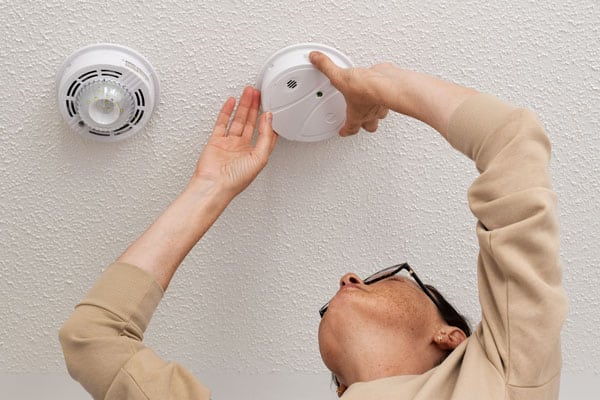Daylight Savings Time Reminds Us of an Essential Home Safety Tip

Use the daylight savings time change as a vital safety reminder to help prevent property damage and potentially save lives.
An essential reminder for home safety
Daylight savings time (DST) ends at 2:00 a.m. on Sunday, November 6, 2023. This event reminds us to reset our clocks (fall back 1 hour in the fall of the year).
DST also reminds us to replace the batteries in smoke and carbon monoxide (CO) detectors in our homes. It's an important reminder because these detection devices can help save our property and lives but are useless without working batteries.
Starting in 2023, the State of Illinois requires residents to use smoke detectors equipped with a 10-year maintenance-free battery.
However, residents may continue to use their current smoke detectors requiring battery changes until a replacement unit is necessary.
Why are smoke detectors more critical than ever to home safety?
The threat of home fires, most often caused by cooking and heating equipment, increases with the holidays and cold weather. According to the National Fire Protection Association (NFPA), heating equipment is a leading cause of fires in U.S. homes.
During 2016 – 2020, local fire departments across the US responded to an estimated 44,210 home fires caused by heating equipment each year. These fires resulted in annual losses of 480 civilian deaths, 1,370 civilian injuries, and $1 billion in direct property damage.
Research shows that most people only have about three or four minutes to get out of a burning house. This limited time is primarily due to the increased use of synthetic materials in modern homes and furniture.
John Drengenberg, the Consumer Safety Director for Underwriters Laboratories, explains: "The backing of your carpet is synthetic, your drapes are synthetic, the couch, the pillows are synthetic. They burn hotter and faster than natural materials do."
Drengenberg also warns, "When your smoke alarm goes off, you don't have time to look around and get your wedding pictures. You get out as quickly as you can."
Why are Carbon Monoxide detectors crucial to home safety?
CO is an odorless, colorless gas that is potentially deadly to humans and pets. Properly installed and working CO detectors are crucial because they can detect the presence of this gas in our homes.
The production of CO occurs whenever a material burns. Homes with attached garages or fuel-burning appliances are more likely to have CO problems. Typical sources of CO in our homes include:
- Clothes dryers
- Water heaters
- Furnaces or boilers
- Fireplaces, both gas and wood burning
- Gas stoves and ovens
- Motor vehicles
- Grills, generators, power tools, lawn equipment
- Wood stoves
- Tobacco smoke
Do smoke and carbon monoxide detectors make a difference?
According to the National Fire Protection Association (NFPA), almost three out of five home fire deaths are caused by fires in properties with no smoke alarms (41 percent) or smoke alarms that failed to operate (16 percent).
Sadly, the report also indicated that when smoke detectors failed to work, nearly half were missing batteries or not connected properly.
The Centers for Disease Control and Prevention (CDC) reports that CO poisoning causes approximately 430 deaths annually in the United States. CO poisoning is also responsible for approximately 50,000 emergency room visits annually.
Guidelines for smoke and carbon monoxide detectors
The National Fire Alarm and Signaling Code requires the installation of a working smoke detector in every room used for sleeping and outside every sleeping area. It also requires a smoke detector on every level of the house, including the basement.
Likewise, if you have any appliances in your home that use wood or natural gas for fuel, you should have at least one CO detector.
You should change the batteries in your smoke detectors and CO detectors when you change your clocks for daylight savings time.
Test devices after replacing the batteries
Be sure your smoke and CO detectors work. After you’ve installed fresh batteries in your devices, test them.
If the detector fails to produce the expected alert, replace the device ASAP. When replacing your smoke detector, you’ll want to purchase one with a 10-year maintenance-free battery.
The Moultrie County Health Department encourages you to change the batteries in your smoke and CO detectors this fall while setting your clocks back 1 hour for DST on or before November 6, 2023.
Remember: When it comes to detecting the threat of a fire or carbon monoxide in your home, a few minutes of warning could save your life.

